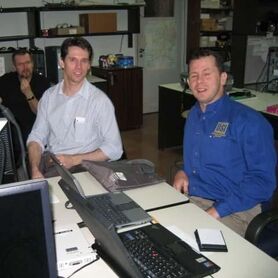 Stacy Mizrahi in my Early IT Days. Stacy Mizrahi in my Early IT Days. In the early days of the internet, there were newsgroups. And behold, they were good! The techy could converse across the digital landscape of the very tiny interwebs. Just the act of sharing thoughts through a compute was exciting. And then came the forum. Originally a concept nested in bulletin board systems, their platform grew life and became a denizen of hypertext. The various forums that sprung up gave specific enclaves voice and community. Quickly, sports enthusiasts, hackers, churches, political ideologues and product fans all had online areas. It was at this point, before the onset of social media, that I could see the problems festering. In these early days, I was a practicing my freethought, exploring ideas and exploring my own limitations of knowledge. I was also getting acquainted with logic fallacies so that I could decipher the bullshit weaved by other folks who lurked on forums. While I prided myself on being a border-lined nihilist, it was near impossible to not "give" to the suggestion of new information. If you were one a sports page, you might buy into other peoples arguments that your team isn't so great. If you are a republican, perhaps your "moderate" sensibilities begin eroding to constant chastising by more vocal hardliners. This is what could be called the hivemind effect. The hivemind is what happens a large number of people share their knowledge with one another and produce a conformity. Your thoughts might be your own, but they have also become molded to the collective. If you want to read some of the science behind this concept, Medium has a great article on the subject. In online groups, we start off as hardened individuals with our own unique thoughts and opinions. But over time, our cognition can start offloading to the group think. Hence, older forums with long standing members will be more alike then newbies. I've caught myself saying and thinking things that I never would have done prior to joining online communities. Hence, I've made the realization that my own desires of being within a "community" has a danger. Long exposure might conform my thoughts in ways that I wouldn't have otherwise wanted. When social media hit the scene, I originally thought it a novel way to share photos with family. But soon I was getting into online fights and backing positions that, in retrospect, were very foolish things to defend. And I way this knowing that I'm strong willed and not easily swayed when I've done my homework. A few years ago I read a book by Cal Newport called Deep Work and it finally spelled out all my issues with social media. Not only was it time consuming, the very system was designed to keep me consuming. I was no longer a knowledge participant, I was a willing slave to it. Prior to reading the book, I had stripped out all my social media use and found it initially disturbing, like a great sense of loss had occurred. I think that is when I was aware that this absorption into the online nexus was damaging. Within a few short days, I found my time freed up and a little peace and come back into my life. But I was missed being "part" of something bigger. With time, that longing passed and I began hearing my inner monologue again. The thoughts were once again , all mine. I no longer seek community on line. I find community in real life communities. I talk to people with bad breath and course language, I hear things that I disagree with and can experience real time emotions without using emojis. I speak to my family more often. I am more involved in real-life community groups. I may not have the novelty experience of sitting in my underwear on my couch, but knowing that I can keep my thoughts independent of the hivemeind is well worth the "hardship".
0 Comments
Leave a Reply. |
 RSS Feed
RSS Feed

